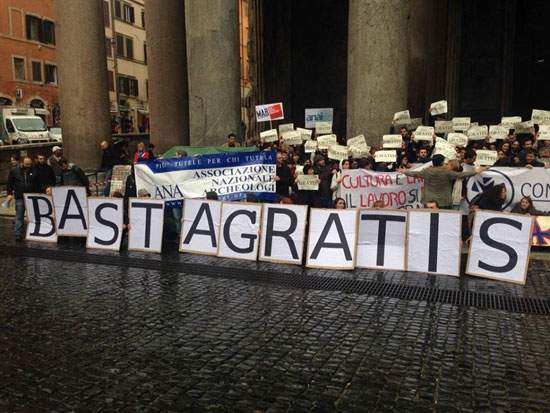Important result for cultural work: yesterday, in fact, the Senate Committee on Culture approved a motion presented by Senator Margherita Corrado (Mixed Group) on the issue of the juxtaposition of work and volunteerism. Work masquerading as volunteer work, as is well known, is a major problem for culture, and although attempts to limit this bad practice have also been proposed, it is still a reality today. The Corrado motion is therefore intended to take the form of a first step toward solving this problem.
“Volunteerism,” the text of the motion premises, “is an important social phenomenon, fortunately widespread in the country in all sectors, which allows individuals to translate into action their natural empathy, made more effective by the strength of the group, by flanking the state, especially on a local scale, in the effort to improve society and ensure to all citizens those minimum levels of quality of life that the Constitution guarantees per tabulas but that so many are still denied.” Moreover, in Italy, volunteering in the field of cultural heritage, Corrado points out, “counts conspicuous and steadily rising numbers, strong as it is, in Italy, of a long and consolidated tradition, to the point that it can almost be considered a habitus of the Italian citizen, immersed from birth in a territorial context that is characterized both by the richness and capillarity of dissemination of public and private cultural heritage, tangible and intangible, a source, moreover, of a pronounced feeling of belonging, as well as for a deep-rooted underestimation of the value of material testimonies as a collective good, which does not favor an effective fight by the State against the scourge of darte crimes, entrusted for fifty years to a dedicated Carabinieri Command.”
However, the senator notes precisely that “the criticalities related to the intervention of the sector volunteer, not only in emergency situations, but also in those of necessity, which can take on a stable character and turn it into a threat to the traditional professions of protection and to those who work on the Patrimony (restorers, diagnosticians, physical anthropologists), are an anomaly that, given the spread of the phenomenon in the absence of clear regulation and the extreme competition that the work-volunteer imbalance has triggered with the professionals of the sector in many ways a war of all against all, we must try to overcome.” And again, the text goes on to say, “the lack of regulation of the professions and volunteering in the cultural heritage sector has in fact produced real culture riders for whom, unlike those in home delivery, the recognition of basic rights still seems far away. The exploitation of professionals goes so far as to force them, in borderline cases, to pass as volunteers, thus mortifying those who have done higher studies for many years and acquired professionalism in the field, as if titles and experience were a reason for exclusion instead of an opportunity.” Compared with the savings produced by volunteering, the social cost of volunteering, the text of the motion notes, “falls on society as a whole in terms of lower income due to non-payment of taxes and social security contributions, contributing to the stagnation of the economy.”
The motion believes that it is necessary “to reject the temptation to assume as a system the voluntary work (even qualified), ultimately by leveraging a misunderstood right to cultural inheritance and individual and collective responsibility for its preservation, for institutional tasks such as the protection of cultural heritage, with the risk of disapplying the multiplied constitutional mandate, referred to in Article 9 of the Constitution,” and therefore commits the government “to apply the principle that subordinate work must always be paid, to guarantee the free and decent existence of people, referred to in Article 36 of the Constitution.”
In the debate, there were reservations from Senator Claudio Barbaro (Fratelli d’Italia), who reported that his group would be in favor if the part on savings and social costs were expunged from the text, and from Senator Maria Saponara (Lega), who asked if there was time margin to propose amendments in order to facilitate a unanimous vote (if not, her party would abstain). Corrado declined Saponara’s invitation and did not accept Barbaro’s proposed amendment: the proposal was therefore put to a vote and approved. Much satisfaction on social media from culture workers, who are now clamoring for a comment from Culture Minister Dario Franceschini.
 |
| Cultural work must be paid for: Senate Culture Committee passes motion |
Warning: the translation into English of the original Italian article was created using automatic tools. We undertake to review all articles, but we do not guarantee the total absence of inaccuracies in the translation due to the program. You can find the original by clicking on the ITA button. If you find any mistake,please contact us.